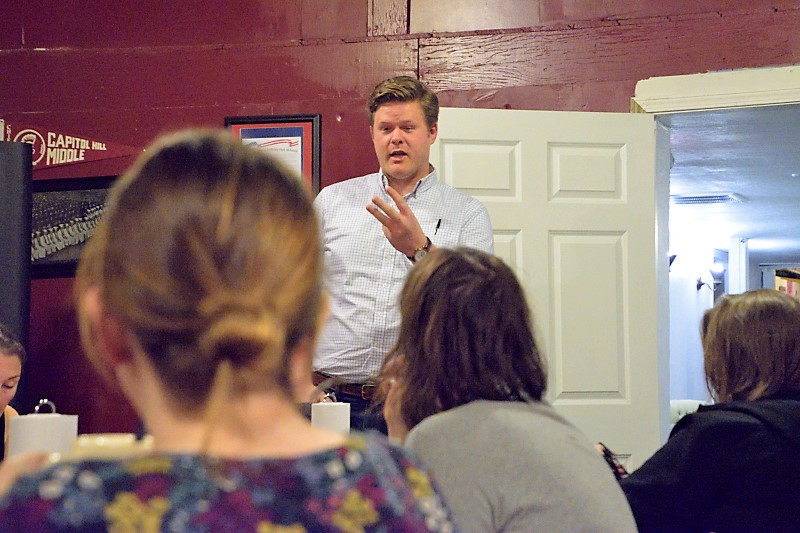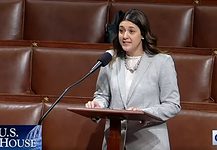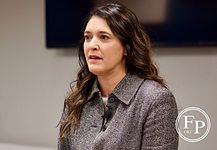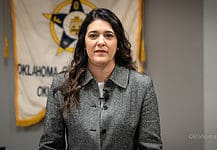Last Updated on October 19, 2021, 4:36 PM | Published: October 19, 2021
This guest opinion article is by Oklahoma State Representative Forrest Bennett (D) represents HD-92 in the core of Oklahoma City.
OPINION – (Free Press) — You might have noticed that our Governor traveled to the southern border recently. From the sparse statements his office has provided, we can gather that it is because he takes seriously the issue of illegal drugs coming into Oklahoma. If you support the Governor, you probably applaud his action. Even if you don’t, you have to acknowledge that illegal drugs are a serious problem across the state. That is certainly part of the story.
No matter how you feel about the Governor, I’ll bet you don’t know the rest of the story. Neither did I, and if it weren’t for the courageous work of local newspaper reporters in western Oklahoma, I don’t know that I ever would.
In places like Beckham County, though, local leaders and law enforcement can’t ignore it. I’m talking about a vast, violent, organized crime ring that traffics drugs, humans, and hate. I’m talking about the Universal Aryan Brotherhood, or UAB, and their ever-expanding influence across Oklahoma.
If this is the first you’re hearing of it, you’re not alone.
Here’s a quick primer: The UAB is a prison-based, white supremacist gang. To think of it in only these terms though is to vastly underestimate what they do.
They, and other gangs like the Irish Mob, operate inside and outside prison walls. Those on the inside have had success using contraband cell phones to coordinate their illegal operations with counterparts on the outside. The legislature took action on the cell phone issue in a recent session, but even in those deliberations, it was not cited as a reason we needed to do something. No matter what happens with the crackdown on contraband phones in prison, the problems will persist.
These gangs recruit members both in and out of prison, and the headlines coming from western Oklahoma (kidnappings, beatings, meth rings, violent sexual assault, and more) make it clear that while the gang might have begun in prison, its influence is much more prolific.
A cursory search of criminal records in Western Oklahoma will yield stories about everything from live-streamed kidnappings and torture to the grooming of young, vulnerable people.
In part, because law enforcement and local leaders in the most impacted areas cannot seem to find willing ears and high-profile partners to draw attention to this, the threat of the UAB and other hate-fueled violent gangs is rapidly growing across rural Oklahoma. How can it possibly be? This is a state that loves law and order. We continue to be a world leader in incarceration, so you know we don’t take kindly to crime.
But when drawing attention to the drug problems at the border, the Governor didn’t mention the fact that the UAB is perhaps the biggest buyer and distributor of those drugs in Oklahoma. That matters.
In reality, Governor Stitt’s PR machine doesn’t need to mention any of that in order to justify his border trip. From a messaging standpoint, a politician doesn’t need to outline the entire problem. In this case, because of a decades-long campaign to get you to feel a certain way when you see a story about the southern border, they didn’t need to do much at all. But messaging and governing are two different things, and in order to govern – and to fix this problem – a leader has to address all aspects of it.
Admittedly, I don’t work in the Governor’s administration. I’m not privy to their private discussions or plans, but I’d like to believe they know all about the UAB and the serious threat they and other white supremacist gangs represent to rural Oklahoma. I hope they’re doing what needs to be done behind the scenes to address it.
But a politician’s bully pulpit is a powerful tool, and shining a bright light on this dark issue would send a strong message to those gangs; so far, our Governor has been willing to literally go the distance to highlight one part of the problem while staying very quiet on another.
You might consider like I have, that the southern border and those who cross it represent the proverbial “other.” America has a rich tradition of using each and every “other” as the “bad guy.” Whether it is to unite people behind a faraway war or justify the racial disparities in the criminal justice system, the “other” is a politician’s favorite scapegoat. Immigrants are particularly popular with those who look for scapegoats because they can and have been blamed for a lack of jobs, the cost of social safety programs, crime rates, and more.
Focusing on the “other” for political gain benefits exactly one person: the politician who is doing it. It doesn’t do much to solve the underlying problem. In fact, it actively hurts those who are most vulnerable. If your entire house is on fire, what good is it to put out the fire in just one room?
In politics today, it is easy and tempting to oversimplify complex issues. I’ve never understood why a politician would take on an issue and not do their best to tackle the whole problem.
In death row cases where the guilt of the individual has been brought into serious doubt, why do prosecutors and politicians double down when the possibility exists that the murderer is actually still out there somewhere? I see this issue of drugs in Oklahoma the same way.
Sure, there are drugs from Mexico that make their way into our state. But the UAB is the most prolific distributor of those drugs. They beat, rape, and kill. They’ve threatened law enforcement and their families. They are a big part of the problem. If the goal is to solve the problem, the UAB deserves more attention.
So, let’s give the Stitt Administration the benefit of the doubt here. After all, I’ve been in the legislature for a few years now and this issue hasn’t come across my desk. Learning about it recently has been jarring and unsettling. But it also sheds light on what happens with those drugs from the border.
That information gives us a complete picture, and now that we have it, we can address the problem. But, do we want to?
Free Press from time to time invites or accepts opinions written by persons who are not in our organization but are known to us in the community or state. If you would like to write an opinion for us, please write to info (at) freepressokc.com.











